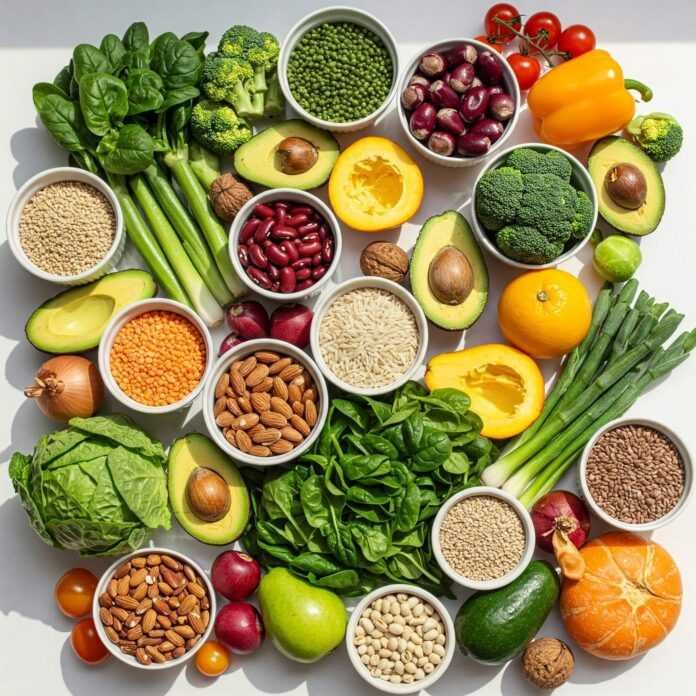Welcome to the world of plant-based eating! If you’ve ever considered embracing a plant-based diet but felt overwhelmed by the idea of drastic changes and limited options, you’re not alone. The perception that a plant-based diet is restrictive and difficult is a common misconception. In reality, adopting a plant-based diet is often much easier and more enjoyable than people imagine. This comprehensive guide will walk you through the simple steps, delicious possibilities, and incredible benefits of making the switch. Get ready to discover just how surprisingly easy a plant-based diet can be!
Debunking the Myths About Going Plant-Based
Many people hesitate to explore a plant-based diet due to certain preconceived notions. Let’s address some of the most common myths:
- Myth 1: It’s all about salads. While vegetables are a cornerstone, a plant-based diet encompasses a vast array of delicious foods, including grains, legumes, fruits, nuts, and seeds. Think hearty lentil stews, creamy avocado pasta, and satisfying tofu scrambles – the possibilities are endless!

- Myth 2: It’s expensive. Eating plant-based can actually be very budget-friendly. Staples like beans, lentils, rice, and seasonal produce are often less expensive than meat and dairy.
- Myth 3: It’s time-consuming to cook. While some recipes might take time, there are countless quick and easy plant-based diet meals you can prepare in minutes. Think overnight oats, quick stir-fries, and simple bean burritos.
- Myth 4: You won’t get enough protein. Plants are packed with protein! Legumes (beans, lentils, chickpeas), tofu, tempeh, quinoa, nuts, and seeds are excellent sources of this essential nutrient. Reference Link: Academy of Nutrition and Dietetics on Vegetarian Diets
Simple Steps to Embrace a Plant-Based Diet
Transitioning to a plant-based diet doesn’t have to be an all-or-nothing approach. Here are some manageable steps you can take:
- Start with simple swaps: Begin by replacing one or two animal-based meals per week with plant-based alternatives. Try swapping beef burgers for black bean burgers or dairy milk for almond milk.
- Focus on adding, not restricting: Instead of dwelling on what you’re “giving up,” focus on incorporating more delicious plant-based foods into your diet. Explore new fruits, vegetables, and grains.
- Explore plant-based versions of your favorites: Most popular dishes have a plant-based counterpart. Look for recipes for vegan pizza, plant-based lasagna, or dairy-free ice cream.

4. Learn about plant-based protein sources: Familiarize yourself with the many ways to get enough protein on a plant-based diet. Experiment with tofu, tempeh, lentils, and quinoa in your cooking. Reference Link: Harvard T.H. Chan School of Public Health on Protein
5. Plan your meals: Taking some time to plan your meals and snacks can make it easier to stick to your plant-based diet goals and ensure you have the necessary ingredients on hand.
6. Don’t be afraid to experiment: The world of plant-based cuisine is vast and exciting. Try new recipes, explore different cuisines, and discover your favorite plant-based foods.
Delicious and Easy Plant-Based Meal Ideas
Here are a few examples to show you how easy and delicious a plant-based diet can be:
- Breakfast: Overnight oats with berries and nuts, tofu scramble with spinach and tomatoes, whole-wheat toast with avocado.
- Lunch: Lentil soup with whole-grain bread, quinoa salad with roasted vegetables, hummus and veggie wraps.

- Dinner: Black bean burgers on whole-wheat buns, pasta with marinara sauce and roasted vegetables, chickpea curry with brown rice.
- Snacks: Fresh fruit, trail mix, vegetable sticks with hummus, air-popped popcorn.
The Incredible Benefits of a Plant-Based Diet
Beyond being surprisingly easy, a plant-based diet offers a wealth of health benefits:
- Improved Heart Health: Plant-based diets are often lower in saturated fat and cholesterol, which can contribute to better cardiovascular health. Reference Link: American Heart Association on Vegetarian Diets
- Weight Management: Plant-based foods are typically lower in calories and higher in fiber, which can help you feel fuller for longer and aid in weight management.
- Reduced Risk of Chronic Diseases: Studies have shown that a plant-based diet may lower the risk of type 2 diabetes, certain types of cancer, and Alzheimer’s disease.
- Better Digestion: The high fiber content in plant-based foods promotes healthy digestion and gut bacteria.
- Environmental Benefits: Choosing plant-based foods can have a positive impact on the 1 environment by reducing greenhouse gas emissions and land use associated with animal agriculture. 1. foodiesparadize.com foodiesparadize.com
Making Your Plant-Based Journey Sustainable
The key to long-term success with a plant-based diet is to make it a sustainable lifestyle change, not a restrictive diet. Be patient with yourself, allow for occasional slip-ups, and focus on progress, not perfection. Connect with online communities or friends who are also exploring plant-based eating for support and inspiration.
Embracing a plant-based diet is a journey of discovery, filled with delicious food and incredible benefits. As you’ve seen, it’s far from the daunting task it might seem. By taking small, manageable steps and focusing on the abundance of flavorful plant-based options available, you can easily integrate this healthy and sustainable way of eating into your life. So, why not give it a try and discover just how surprisingly easy a plant-based diet can be for you?





































